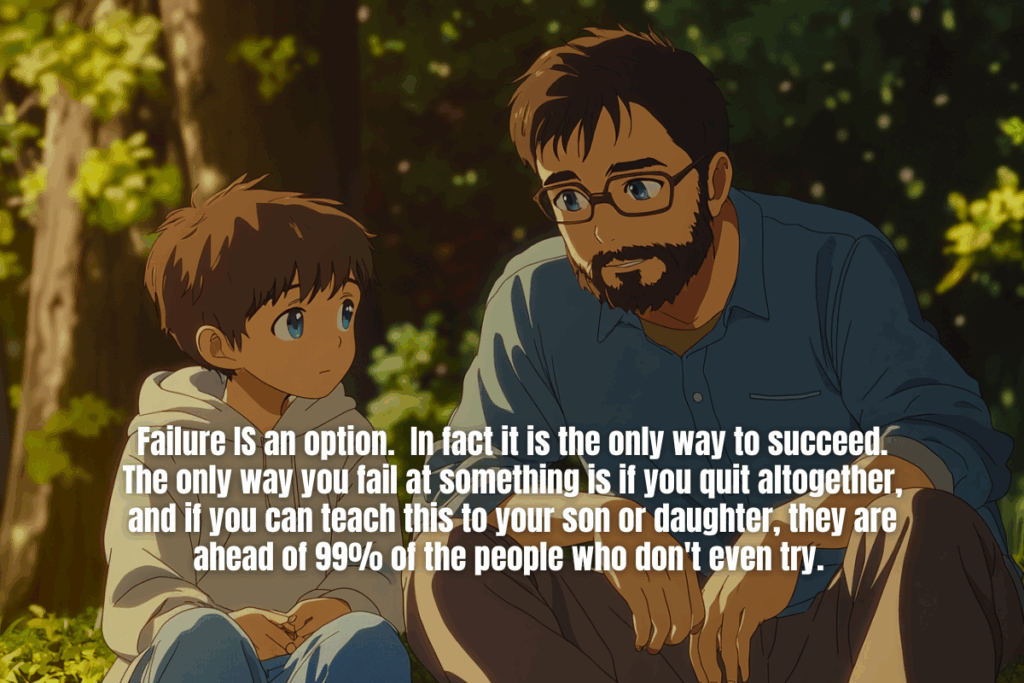Every dad fails.
It’s not always dramatic. Sometimes it’s snapping when you shouldn’t. Forgetting something important. Making a promise you didn’t follow through on. Losing your cool over something small and then sitting in the shame of it. It’s something I used to struggle with a lot. And so when I wanted to learn how to be a better father, I knew that trying to get better at failing was not just a good thing for me to learn, but something I can teach my kids.
In a world that prizes productivity, perfection, and polish, what your child really needs is a father who knows how to recover—with humility, with grace, and with presence.
Failure IS an option in this case. The only way you fail at something is if you quit altogether, and if you can teach this to your son or daughter, they are ahead of 99% of the people who don’t even try.
Fail better. Fail often. I remember this quote from John Burroughs, “A man can fail many times, but he isn’t a failure until he begins to blame somebody else.” You have to own your failures and learn from them.
Failure Is the Classroom
Kids don’t learn emotional strength from watching someone succeed.
They learn it from watching someone fall down and get back up. And once they see it, they can emulate it themselves and learn failing isn’t the end of the world. How to be a better father is realizing this and cultivating these ideals in their head so they can get really good at failing.
Your child is constantly watching you. And whether you like it or not, they’re studying the way you respond when life doesn’t go your way. They absorb how you treat yourself after you make a mistake. They internalize the language you use when you talk about failure. Are you brutal to yourself? Defensive? Do you shut down, make excuses, or show up the next day with a clearer head?
This is the model they’ll imitate.
You don’t need to be perfect. But you do need to be honest. Because when you fail in front of your kids and handle it with accountability instead of shame, you give them permission to be human and strong. This is where the superpower of failing begins.
The Myth of the Flawless Father
Let’s kill this idea once and for all: You are not failing your kids because you mess up. You fail them when you pretend you don’t. This one hits me hard, as I have dealt with this one personally. Growing up not hearing apologies when my parents made mistakes made things…awkward. There would be this silence after there was a freak out, or when they made some threats. Nothing about “I’m sorry I lost my cool back there.”
How to be a better father? Cut that shit permanetly . Accountability starts with you!
Perfection is unrelatable. If your kids only ever see the edited version of you always calm, always right they won’t feel safe coming to you when they mess up. They’ll feel like a disappointment just for being human.
On the flip side, imagine the power in a child seeing their father say:
“That wasn’t okay. I lost my patience. I’ll do better tomorrow.”
That’s strength. That’s leadership. That’s trust in action. Accountability and integrity are just as important in the family home as they would be in the work place. No one likes a fellow co-worker who doesn’t own their mistakes. How do you think your kids would like it?
Grace in the Grind: What Failing Well Looks Like
Failing well doesn’t mean dramatic apologies or overcompensating. It means:
- Owning it early. No blaming. Just acknowledgment.
- Naming it clearly. “I didn’t handle that well.” or “I was unfair.”
- Trying again without ego. You don’t need to defend your mistake. Just learn from it and move on.
Your kids don’t need you to suffer. They need you to grow.
Small, consistent course-corrections are what build trust over time. The faster you can calmly correct things, the better for your kids to see. They will emulate how you handle these situations. Be a better teacher.
Why Your Struggle Teaches Strength
Studies on child development show that kids learn emotional resilience by watching it. They need to see struggle and regulation happen in real-time. This is how emotional intelligence is transferred not by lectures, but by exposure.
When you allow your child to witness your emotional self-regulation, you give them an internal map for how to manage their own stress.
You also remove the stigma from messing up.
In doing this, you are literally shaping the voice in their head:
- Will they hear, “You idiot. Why did you do that?”
- Or will they hear, “That was a mistake. I can fix it. I can try again.”
The voice they hear depends on how you talk to yourself—and to them—when you fail.

Small Fails, Big Lessons
Some of the most powerful lessons come from the smallest moments:
- You forgot their soccer game. You own it, and you make time the next day.
- You yelled during a stressful morning. That night, you apologize and ask how they felt.
- You didn’t follow through on something. You don’t make excuses. You say, “That’s on me.”
These moments matter. Not because they’re huge. But because they’re real.
Kids remember how they felt in those moments. Not whether you were perfect but whether you showed up afterward. The biggest things I have tried to work on with Henry and Sal are when I have my moments, I try to correct it as quickly as I can.
A good example of this is one day about a week ago I was really tired and a little extra sensitive. I overreacted to something Birdie did (my daughter) and yep, definitely made her upset. I left the room for a few moments, took a few deep breaths and came back to say ” Birdie, I’m sorry baby, I’ve been a little extra tired and stressed and I shouldn’t have taken that out on you.”
She responded, “that’s okay daddy, you are just tired.” And that made me feel a bit sad, but she learned that mistakes can be made and can ALSO be worked on so they don’t happen again.
How To Be A Better Father? Building a Failure-Friendly Home
Your home doesn’t need to be mistake-free. It needs to be recovery-rich.
Ways to foster that:
- Praise effort, not just outcome.
- Let them see you try things and struggle.
- Talk openly about what you’re learning, even when it’s hard.
- Model bounce-back behavior. Not fake optimism but grounded resilience.
Make your home a place where mistakes are followed by learning not shame. It’s one of the biggest problems in the world today. In sports we have participation trophies. In school failing means negative things. But we need to train our kids that failure is great. It’s the only way to grow, learn and get better!
A New Definition of Success
Being a better father isn’t about eliminating failure. It’s about reframing it:
- From something to hide → to something to grow from
- From a mark of weakness → to a badge of awareness
- From shame → to strength
Your child doesn’t need a father who never fails. They need one who can fail with dignity, own it, and come back the next day ready to try again.
That’s how you lead. That’s how you love. That’s how you teach them to live.
If you have been feeling overwhelmed lately I created something that might be able to help. “The Stoic Dad Playbook: 21 Days To Become A More Mindful Father” creates an easy to follow framework that can help you become more mindful and present.





